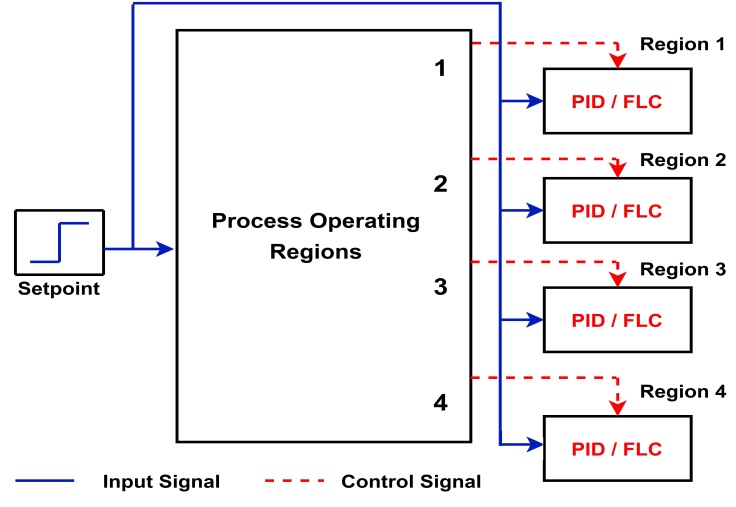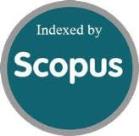Design and Implementation of Adaptive PID and Adaptive Fuzzy Controllers for a Level Process Station
DOI:
https://doi.org/10.46604/aiti.2021.6047Keywords:
adaptive PID, adaptive fuzzy, nonlinear system, level control, data acquisitionAbstract
This proposed work proposes the design and real-time implementation of an adaptive fuzzy logic controller (FLC) and a proportional-integral-derivative (PID) controller for adaptive gain scheduling that can be configured for any complex industrial nonlinear application. Initially, the open-loop test of the single-input single-output (SISO) system, with nonlinearities and disturbances, is conducted to represent the mathematical model of the process around a set of equilibrium points. The adaptive controllers are then developed and deployed by using the national instruments reconfigurable input/output data acquisition device (NI RIO), NI myRIO-1900, and the control parameters are adapted in real-time corresponding to the changes in the process variable. The resulting servo and regulatory performance of the controllers are compared in MATLAB® software. The adaptive fuzzy controller is deduced to be the better controller as it can generate the desired output with quicker settling times, fewer oscillations, and negligible overshoot.
References
K. J. Åström, Adaptive Control, Dover Books on Electrical Engineering, 2nd ed. Berlin: Heidelberg, 1991.
T. Hagiwara, I. Murakami, T. Sakanushi, K. Yamada, and Y. Ando, A Design Method of Robust Stabilizing Modified PID Conterollers for Multiple-Input∕Multiple-Output Plants, vol. 5. Three Park Avenue, New York, NY 10016-5990: ASME, 2009.
K. J. Åström and R. M. Murray, Feedback Systems: An Introduction for Scientists and Engineers, Princeton University Press, 2008.
K. H Ang, G. Chong, and L. Yun, “PID Control System Analysis, Design, and Technology,” IEEE Transactions on Control Systems Technology, vol. 13, no. 4, pp. 559-576, July 2005.
K. J. Åström and T. Hägglund, “The Future of PID Control,” Control Engineering Practice, vol. 9, no. 11, pp. 1163-1175, November 2001.
G. Stein, Adaptive Flight Control, Connecticut: Yale University, 1980.
W. J. Rugh and J. S. Shamma, “Research on Gain Scheduling,” Automatica, vol. 36, no. 10, pp. 1401-1425, October 2000.
J. S. Shamma, “Analysis and Design of Gain Scheduled Control Systems,” Department of Mechanical Engineering, Massachusetts Institute of Technology, Technical Report LIDS-TH-1770, May 1988.
J. S. Shamma and M. Athans, “Guaranteed Properties of Gain Scheduled Control for Linear Parameter-Varying Plants,” Automatica, vol. 27, no. 3, pp. 559-564, May 1991.
W. J. Rugh, “Analytical Framework for Gain Scheduling,” American Control Conference, May 1990.
M. Sain and S. Yurkovich, “Controller Scheduling: A Possible Algebraic Viewpoint,” American Control Conference, June 1982.
M. K. Masten, “Inertially Stabilized Platforms for Optical Imaging Systems,” IEEE Control Systems Magazine, vol. 28, no. 1, February 2008.
Z. Yu, J. Z. Cao, H. T. Yang, H. N. Guo, B. Gao, and L. Yang, “Advanced Fuzzy PID Composite Control for Stabilized Platform System,” 2012 IEEE International Conference on Mechatronics and Automation, August 2012.
A. A. Roshdy, Y. Z. Lin, C. Su, H. F. Mokbel, and T. Wang, “Design and Performance of Nonlinear Fuzzy Logic PI Controller for Line of Sight Stabilized Platform,” International Conference on Optoelectronics and Microelectronics, August 2012.
M. Yang, X. H. Gao, X. J. Zhang, and C. Wang, “Simulation Analysis of Multi-Axle Vehicle's Turning Braking Stability Based on Fuzzy Control Theory,” The 2nd International Conference on Industrial Mechatronics and Automation, May 2010.
H. Zhou, W. Chen, and K. Fang, “A Fuzzy Control Algorithm for Collecting Main Pressure Controlling Using Expert Control,” International Conference on Intelligent Computation Technology and Automation, May 2010.
G. Chen, “Conventional and Fuzzy PID Controllers: An Overview,” International Journal of Intelligent and Control Systems, vol. 1, no. 2, pp. 235-246, 1996.
L. Luoh, “Control Design of T-S Fuzzy Large-Scale Systems,” International Journal of Innovative Computing, Information and Control, vol. 5, pp. 2869-2880, September 2009.
M. Wang, B. Chen, and S. Tong, “Adaptive Fuzzy Tracking Control for Strict-Feedback Nonlinear Systems With Unknown Time Delays,” International Journal of Innovative Computing, Information and Control, vol. 4, pp. 829-837, April 2008.
R. Palm, “Robust Control by Fuzzy Sliding Mode,” Automatica, vol. 30, no. 9, pp. 1429-1437, September 1994.
M. Short and F. Abugchem, “On the Jitter Sensitivity of an Adaptive Digital Controller: A Computational Simulation Study,” International Journal of Engineering and Technology Innovation, vol. 9, no. 4, pp. 241-256, September 2019.
J. L. Peczkowski and M. K. Sain, “Design of Nonlinear Multivariable Feedback Controls by Total Synthesis,” American Control Conference, IEEE, July 1984, pp. 688-697.
M. K. Sain and J. L. Peczkowski, “Nonlinear Multivariable Design by Total Synthesis,” American Control Conference, June 1982.
J. L. Peczkowski and M. K. Sain, “Synthesis of System Responses: A Nonlinear Multivariable Control Design Approach,” American Control Conference, June 1985.
V. Aparna, M. Hussain K, D. N. Jamal, and M. S. M. Shajahan, “Implementation of Gain Scheduling Multiloop PI Controller Using Optimization Algorithms for a Dual Interacting Conical Tank Process,” 2nd International Conference on Trends in Electronics and Informatics, May 2018.
X. Zhou, L. Li, Y. Jia, and T. Cai, “Adaptive Fuzzy/Proportion Integration Differentiation (PID) Compound Control for Unbalance Torque Disturbance Rejection of Aerial Inertially Stabilized Platform,” International Journal of Advanced Robotic Systems, vol. 13, no. 5, pp. 1-11, October 2016.
C. Fuyan, Z. Guomin, L. Youshan, and X. Zhengming, “Fuzzy Control of a Double-Inverted Pendulum,” Fuzzy Sets and Systems, vol. 79, no. 3, pp. 315-321, May 1996.
S. R. Mahapatro, B. Subudhi, and S. Ghosh, “Adaptive Fuzzy PI Controller Design for Coupled Tank System: An Experimental Validation,” IFAC Proceedings Volumes, vol. 47, no. 1, pp. 878-881, 2014.
S. R. Mahapatro, B. Subudhi, and S. Ghosh, “Design and Real‐Time Implementation of an Adaptive Fuzzy Sliding Mode Controller for a Coupled Tank System,” International Journal of Numerical Modelling: Electronic Networks, Devices and Fields, vol. 32, no. 1, p. e2485, September 2018.
G. M. Tamilselvan and P. Aarthy, “Online Tuning of Fuzzy Logic Controller Using Kalman Algorithm for Conical Tank System,” Journal of Applied Research and Technology, vol. 15, no. 5, pp. 492-503, October 2017.
G. Sakthivel, T. S. Anandhi, and S. P. Natarajan, “Design of Fuzzy Logic Controller for a Spherical Tank System and Its Real Time Implementation,” International Journal of Engineering Research and Applications, vol. 1, no. 3, 2011.
G. Stephanopoulos, “Chemical Process Control: An Introduction to Theory and Practice,” Automatica, vol.21, no. 4, pp. 502-504, July 1985.
J. M. Mendel, “Fuzzy Logic Systems for Engineering: A Tutorial,” Proceedings of the IEEE, vol. 83, no. 3, pp. 345-377, March 1995.
L. A. Zadeh, “Fuzzy Logic,” Computer, vol. 21, no. 4, pp. 83-93, April 1988.

Published
How to Cite
Issue
Section
License
Submission of a manuscript implies: that the work described has not been published before that it is not under consideration for publication elsewhere; that if and when the manuscript is accepted for publication. Authors can retain copyright in their articles with no restrictions. is accepted for publication. Authors can retain copyright of their article with no restrictions.
Since Jan. 01, 2019, AITI will publish new articles with Creative Commons Attribution Non-Commercial License, under The Creative Commons Attribution Non-Commercial 4.0 International (CC BY-NC 4.0) License.
The Creative Commons Attribution Non-Commercial (CC-BY-NC) License permits use, distribution and reproduction in any medium, provided the original work is properly cited and is not used for commercial purposes.







